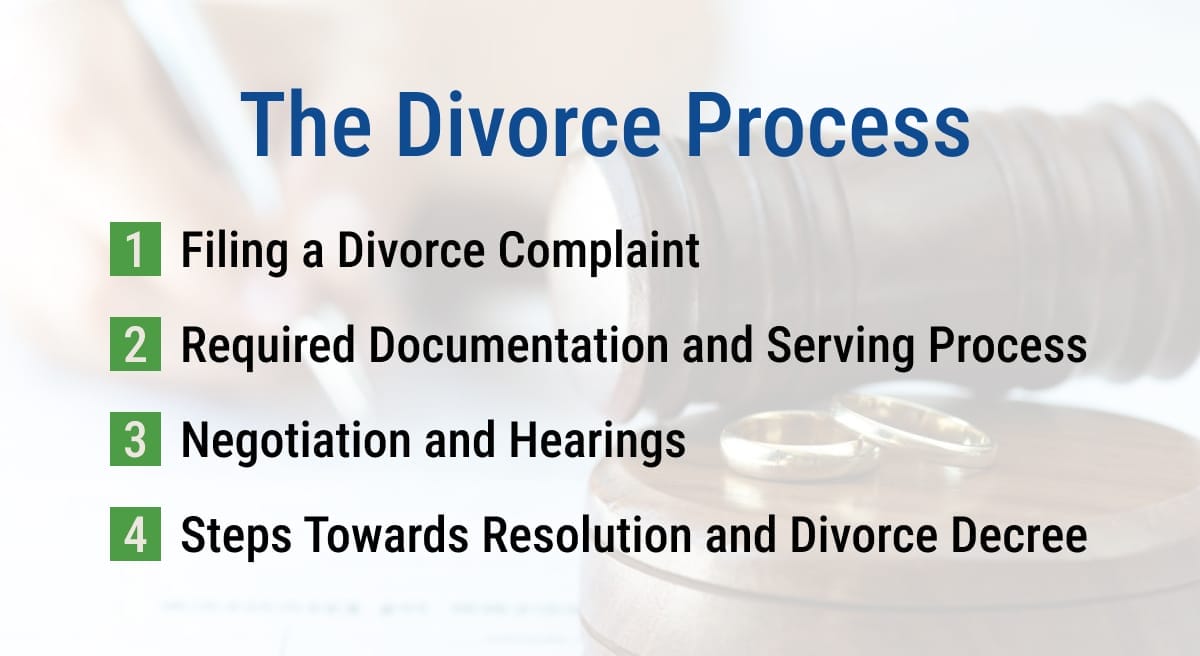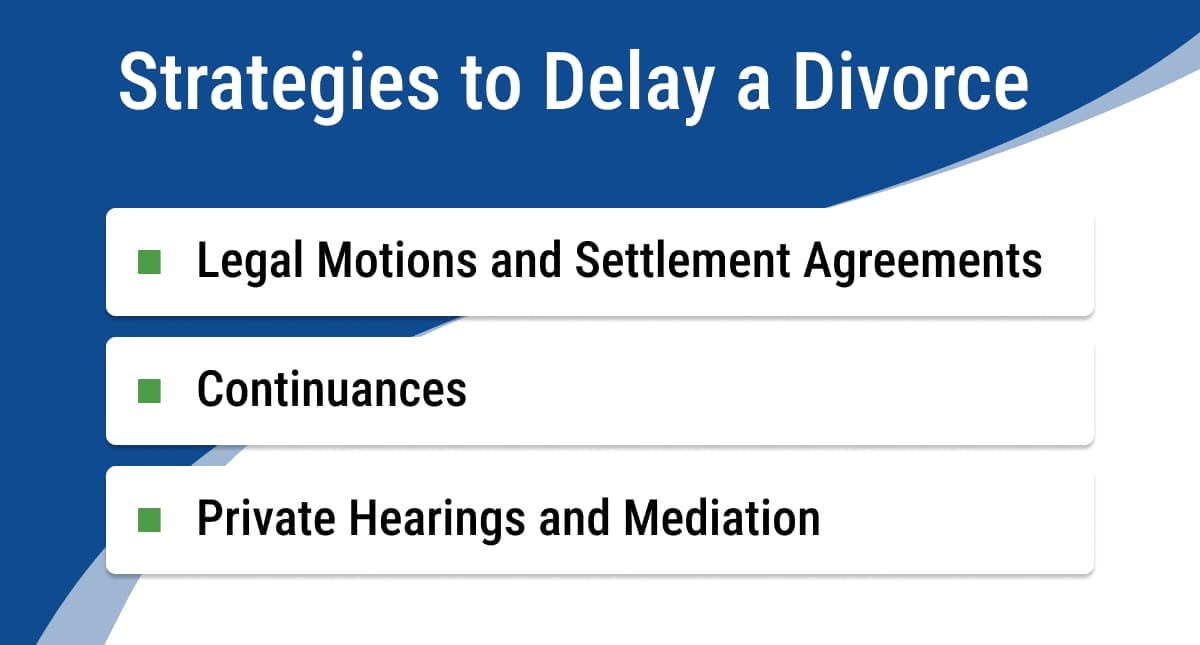Nov 22, 2023
How Long Can You Delay A Divorce in Pennsylvania
Divorce in PA
Delaying a divorce in Pennsylvania requires more than just a cursory understanding of the law; it demands a strategic approach to the unique timeline of your situation.
While not infinite, the ability to postpone the finalization of divorce offers a critical window for those seeking to protect their interests or pursue reconciliation.
This article uncovers the nuanced tactics and legal wisdom that can empower you to take control of your divorce timeline, ensuring that every decision is made with precision and care.
The Four Types of Divorce in Pennsylvania
Each type of divorce in Pennsylvania is designed to address different circumstances, ensuring that the process is as fair and just as possible. Understanding these distinctions is the first step in preparing for a future that aligns with your needs and goals.
Mutual Consent Divorce
When both parties agree that their marriage cannot be salvaged, they may take the first step and opt for a mutual consent divorce. This is often seen as a straightforward path to dissolving a marriage because it requires an agreement from both spouses. Here’s what you need to know:
- 90-Day Waiting Period: Pennsylvania law mandates a 90-day waiting period from when the divorce is filed. This cooling-off period is designed to give couples a final opportunity to reconsider.
- Affidavit Requirements: Each spouse must sign an affidavit of consent, declaring the marriage irretrievably broken.
No-Fault Divorce After Separation
For couples who find themselves at an impasse but without mutual consent, there is the option of a no-fault divorce after a period of separation. Significant changes to this law have made the process more expedient:
- Reduced Waiting Period: Previously, couples had to live apart for two years before filing. As of 2016, this waiting period has been reduced to one year, allowing for a quicker transition to post-divorce life.
Fault Divorce
In cases where one spouse’s misconduct has led to the breakdown of the marriage, a fault divorce may be pursued. This type of divorce is more complex and requires substantial proof:
- Grounds for Fault Divorce: Grounds include adultery, desertion, cruel treatment, bigamy, and more.
- Evidence Requirements: The accusing spouse must provide compelling evidence to support the claim of fault, which a court will then examine.
Divorce Following Institutionalization
Pennsylvania law also provides a divorce route for spouses facing the institutionalization of their partner due to mental health reasons:
- Conditions: One spouse must have been institutionalized for a mental disorder for at least 18 months, with no discharge planned within the next 18 months.
- Waiting Periods: The law stipulates specific waiting periods related to the institutionalization that must be observed before the divorce can proceed.
Waiting Periods for No-Fault Divorce
The timeline for legally ending a marriage in Pennsylvania can vary significantly depending on your chosen route. For those pursuing a no-fault divorce, understanding the waiting periods is essential.
These mandatory pauses are not just about ticking off days on a calendar; they’re about providing space for thoughtful decision-making and ensuring that all parties are moving forward with clarity and intention.
Unilateral No-Fault Divorce Changes in 2016
A significant shift occurred in Pennsylvania’s divorce law in 2016, mainly affecting unilateral no-fault divorces:
- Prior Law: Before the change, one spouse could initiate a no-fault divorce after a two-year separation, even if the other spouse disagreed.
- Post-2016 Law: The waiting period for living separately was reduced to one year, streamlining the process for those seeking to dissolve their marriage without mutual consent.
This amendment was a game-changer, acknowledging the emotional and financial strain a prolonged waiting period can impose on individuals and families.
Mutual Consent Divorce and the 90-Day Rule
For couples in mutual agreement about their divorce, Pennsylvania offers a more expedited process:
- 90-Day Waiting Period: After filing for a mutual consent divorce, there is a mandatory 90-day waiting period. This serves as a reflective period for both parties.
- Affidavit of Consent: Following the waiting period, both spouses must submit an affidavit of consent to the court, affirming their decision to divorce.
The 90-day Rule is designed to balance the need for a swift resolution with the opportunity for couples to consider their decision entirely. It’s a period where the reality of the divorce decision can settle in, and the finality of the process becomes more tangible.
The Divorce Process in Pennsylvania
Throughout each stage of the divorce process in Pennsylvania, it’s essential to approach each step with a clear understanding and a strategic mindset. Whether through negotiation or court hearings, the goal is a resolution that respects the rights and needs of both parties.
Remember, this process is not just about legally ending a marriage; it’s about laying the groundwork for your future.
Filing a Divorce Complaint
The first step in the legal journey of divorce is filing a complaint with the court. This document sets the stage for the entire process:
- Initial Paperwork: The complaint must include vital information about both spouses, the marriage, any children, grounds for divorce, and the type of divorce being sought.
- Filing Requirements: Along with the complaint, you must submit additional forms, which may vary depending on your county.
Required Documentation and Serving Process
Once the complaint is filed, the next step is to officially notify the other spouse, known as the serving process:
- Service of Process: This involves delivering a copy of the divorce complaint to your spouse, which can be done through various methods, such as a sheriff or a professional server.
- Proof of Service: You must provide the court with proof that your spouse has been served, which is critical to moving the process forward.
Negotiation and Hearings
With the formalities of filing and serving out of the way, the focus shifts to resolving the practical aspects of the divorce:
- Negotiation: Spouses may negotiate terms regarding property division, spousal support, and child custody. If they can reach an agreement, they can avoid a trial.
- Hearings: If negotiation fails, the court will schedule hearings to decide on contested issues.
Steps Towards Resolution and Divorce Decree
The final stages of the divorce process involve the court’s judgment and the official dissolution of the marriage:
- Final Agreement: All agreements or court orders are compiled into a final document outlining the divorce terms.
- Divorce Decree: Once the judge signs off on the agreement, the divorce decree is issued, officially ending the marriage.
Equitable Distribution in Pennsylvania Divorces
When a marriage ends in Pennsylvania, the division of marital property is governed by the principles of equitable distribution. This legal framework is designed to divide assets in a fair, though not necessarily equal manner, considering a range of factors that reflect the circumstances of each spouse.
What is Equitable Distribution?
Equitable distribution divides property at the time of divorce and seeks to be just and reasonable. Unlike community property states, where assets are split 50/50, Pennsylvania’s approach to asset division is more nuanced:
- Marital Property: Only property acquired during the marriage is subject to division. This includes assets like homes, cars, and retirement accounts, regardless of whose name is on the title.
- Separate Property: Assets acquired before the marriage, after separation, or by gift or inheritance are typically considered separate property and not subject to division.
Implications for Asset Division
The process of equitable distribution in Pennsylvania involves several steps and considerations:
- Identification of Assets: All marital property must be identified and valued. This can involve appraisals and financial analysis.
- Consideration of Factors: The court considers many factors, such as the length of the marriage, each spouse’s financial situation, contributions to the marriage (including homemaker contributions), and the standard of living established during the marriage.
- Distribution: The court will then distribute the marital assets equitably, which may result in one spouse receiving more than half of the marital property if the factors warrant such a division.
The concept of equitable distribution acknowledges that each marriage is unique, and therefore, each divorce should be approached with a tailored analysis of the couple’s financial situation. It’s a complex process that requires a clear understanding of the law and your financial picture’s specifics.
Factors Affecting Divorce Timelines
The divorce timeline in Pennsylvania can be as unique as the marriage it dissolves. Several factors can either streamline or extend the process, and understanding these can help you set realistic expectations for your journey through divorce.
Assets and Debts
The complexity of your financial landscape is a significant determinant of your divorce timeline:
- Complexity of Assets: High-asset divorces or those involving business ownership can take longer due to the detailed financial analysis required.
- Valuation of Assets: Appropriately appraising properties, investments, and retirement accounts is essential and time-consuming.
- Division of Debts: Determining who is responsible for marital debts involves negotiation and, potentially, litigation, which can extend the timeline.
Prenuptial Agreements
A prenuptial agreement can significantly impact the divorce process:
- Clarity of Terms: A well-drafted prenup can simplify asset division, potentially speeding up the process.
- Enforceability Issues: If the prenup is contested, this can lead to additional hearings and legal scrutiny, prolonging the divorce.
Children
Children are a central concern in divorce proceedings, and their welfare can influence the timeline:
- Custody Arrangements: Negotiating custody can be swift with mutual agreement but may extend to lengthy court battles without it.
- Child Support and Visitation: Establishing fair support and visitation schedules can require additional negotiations and court time.
These factors can complicate a divorce, impacting how swiftly you can move from filing to finalization.
Strategies to Delay a Divorce in Pennsylvania
Whether for personal, financial, or strategic reasons, there may be instances where delaying a divorce in Pennsylvania is necessary. Understanding the legal avenues for postponing a divorce can provide the breathing room to align your affairs or reassess the decision.
Legal Motions and Settlement Agreements
The legal system offers mechanisms to adjust the pace of the divorce process:
- Filing Motions: Attorneys can file motions to delay proceedings, often for valid reasons such as the need for additional time to gather information or for unforeseen circumstances.
- Negotiating Settlements: Conducting thorough settlement negotiations can extend timelines as parties work towards a mutually agreeable resolution.
Continuances
Requesting a continuance is a common legal strategy to delay court proceedings:
- Scheduling Conflicts: A request for a continuance can be made due to scheduling conflicts, allowing for a rescheduled hearing.
- Additional Preparation Time: A continuance can be requested if more time is needed to prepare for a hearing.
Private Hearings and Mediation
Alternative dispute resolution methods can also impact the divorce timeline:
- Private Hearings: Opting for private hearings with a judge or arbitrator can sometimes result in scheduling delays due to the availability of all involved parties.
- Mediation: Choosing mediation can either expedite or delay the finalization of a divorce, depending on how quickly both parties can agree.
The Benefits of Divorce Mediation in Pennsylvania
While understanding the various ways to delay a divorce in Pennsylvania is important, it’s equally crucial to consider alternative methods of resolving divorce disputes, such as divorce mediation. Mediation offers several benefits over traditional litigated divorce, making it a compelling choice for many couples.
1. Cost-Effectiveness
Divorce mediation is generally more cost-effective than a litigated divorce. The process is typically quicker and less formal, which can significantly reduce legal fees and court costs. This financial saving is particularly beneficial for couples looking to preserve their resources for post-divorce life.
2. Control and Flexibility
Mediation puts the decision-making power directly in the hands of the spouses rather than a judge. This control allows for more flexible and creative solutions tailored to the unique needs of both parties and their children. It fosters a collaborative environment where both parties can openly discuss and negotiate the terms of their divorce.
3. Reduced Conflict and Stress
The mediation process is inherently less adversarial than going to court. Promoting cooperation and communication can help reduce the emotional stress and conflict often associated with divorce proceedings. This is particularly beneficial for maintaining a cordial relationship post-divorce, which is essential when children are involved.
4. Privacy and Confidentiality
Mediation sessions are private and confidential, unlike public court proceedings. This privacy allows couples to discuss sensitive issues without fear of public exposure, providing a more comfortable and secure environment to reach an agreement.
5. Faster Resolution
Mediation can often lead to a quicker resolution compared to litigation. Since the process is more direct and less formal, couples can avoid the lengthy court schedules and procedural delays common in traditional divorce cases.
6. Better Outcomes for Children
When parents work together to resolve their issues in mediation, it can lead to better outcomes for their children. Mediation encourages parents to focus on the best interests of their children, often leading to more amicable custody and visitation arrangements.
7. Long-Term Compliance
Agreements reached in mediation are typically more satisfactory to both parties since they are crafted mutually. This often leads to higher compliance rates with the divorce agreement terms, reducing the need for future legal interventions.
Final Thoughts
Understanding how long you can delay a divorce in Pennsylvania is crucial for those who need additional time to sort out their personal and financial affairs before finalizing the end of their marriage.
So, don’t hesitate to reach out for professional advice that can help you understand the nuances of your situation and explore the best strategies for your future.
Contact Alpha Divorce to discuss your case and discover how we can assist you in managing your divorce timeline with confidence and clarity.





